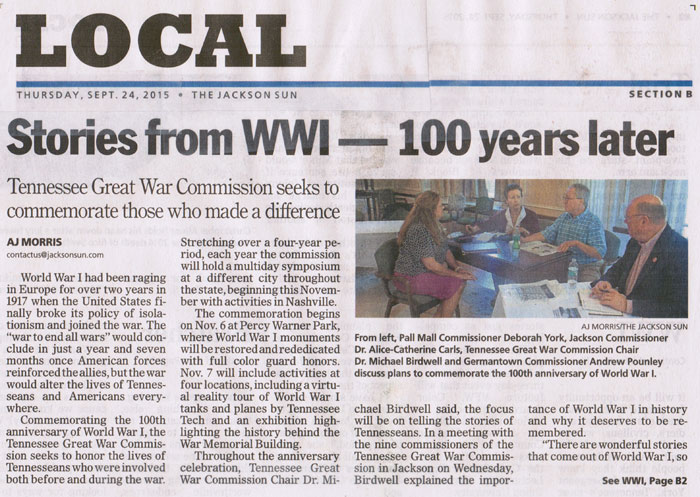


The collective and individual stories and sacrifices of more than 130,000 Tennesseans in World War I will be shared and celebrated anew 100 years later through the efforts of a new statewide commission.
Gov. Bill Haslam has entrusted the nine-member Tennessee Great War Commission to create events, share information and educate others as they tell the story of the Volunteer State and its citizens during the war. Dr. Michael Birdwell, a Tennessee Tech University history professor, appointed by Gov. Haslam was unanimously elected chairperson of the commission.
“I am honored to be granted such an opportunity and responsibility,” Birdwell said. “I look forward to working closely with the other commissioners as we tell hundreds of stories about soldiers, civilians, women, minorities, tragedies and triumphs. While most people think they know the story of Sergeant York, Tennessee’s most famous hero of the war, there are hundreds of stories just as compelling, though largely forgotten. It is our responsibility to resurrect those stories during the war’s centennial.”
Tennessee’s Great War Commission was created through legislation passed by the General Assembly in 2013 and supports the U.S. WWI Centennial Committee’s efforts to honor all American WWI veterans, to educate people about this period in our history, to remember and recognize the citizens of each state who served, and to honor service and sacrifice by soldiers and their families.
The effort will engage state and local veterans groups, state legislators, libraries and museums, colleges and universities and local community groups, county historians and archives, as well as state parks and state historic sites.
Examples of large projects that will help educate children and adults alike includes partnerships Museum of the Military Experience in Brentwood and its traveling exhibit “In the Footsteps of Sergeant York,” as well as planned 4,100 square foot military-themed museum supported by the City of Lebanon.
All commissioners hold specific expertise and shared dedication to WWI topics. The commission board members are Sen. Doug Henry, Blount County Archivist Jackie Glenn, UT Martin professor Dr. Catherine Carls, East Tennessee State professor Dr. Daryl Carter, Andy Pouncey of Germantown, UT's Center for the Study of War and Society’s Dr. Vejas Liulevicius, Metro Nashville Archivist Ken Fieth, and Richard Gonzales of Memphis.
Birdwell serves as the curator of Alvin C. York’s papers and was a part of the Sergeant York Project, a team of expert researchers and scientific investigators from the United States, France and England assembled to unearth the story of Sergeant York's endeavors in France.
Sergeant York is Tennessee’s most recognized name from WWI, having received the Medal of Honor for leading an attack on a German machine gun nest, killing 20 German soldiers and capturing 132 others with seven other doughboys. But the commission’s goal is to showcase the wealth of information about other Tennesseans and their contributions and bravery. In fact, Tennessee is home to five other WWI Medal of Honor recipients: Joseph B. Adkinson, James Ernest Karnes, Milo Lemert, Edward R. Talley, and Calvin John Ward.
“Adkinson, Karnes, Lemert, Talley and Ward served with the 30th Division but fought under British and Australian command, and while knowledge of their exploits is well-known in Europe and Down Under, it is virtually unknown in Tennessee,” Birdwell said. “On September 29, 1918, soldiers of the 30th Division did the unconceivable — they breached the Hindenburg line near Bellicourt, and helped usher in the defeat of the Central Powers. They were the only American division to parade before King George V.”
As the commission works to fill the 2015-2018 calendar with local and statewide events, they are bringing to light facts that show Tennessee’s outstanding participation and sacrifice. The commission is actively seeking photos, letters, and other memorabilia in personal collections to photograph and digitize in order to build a more comprehensive database about Tennesseans in World War I.
Of the more than 130,000 Tennesseans, about 61,000 were drafted, according to the U.S. WWI Commission. Military and naval authorities had implemented a policy that prevented large groups of men from a single state from serving in any one division overseas.
Tennessee’s Meharry Medical College in Nashville produced the largest contingent of African-American medical doctors for WWI Army service, according to historian Doug Fisher. Unfortunately due to the Jim Crow era racism, they rarely treated American soldiers, but were embraced by the French and British for their outstanding service.
“Of 104 physician/officers who successfully completed the U.S. Army Medical Officers Training Camp (Colored) at Fort Des Moines Iowa in 1917, 34 were Meharry alumni. That was more than twice the number from ANY other medical school. The post-war legacy of these doctors is amazing,” Fisher said.
The Tennessee Great War Commission held a recent meeting in Knoxville at the Center for the Study of War and Society. The first large public event is scheduled at the Nashville Public Library on Nov. 8 and will feature a day-long symposium investigating Tennesseans who served in World War I before the U.S. declared war.
Volunteers are needed to help bring the numerous stories to life and are encouraged to contact Dr. Birdwell at birdie@tntech.edu.